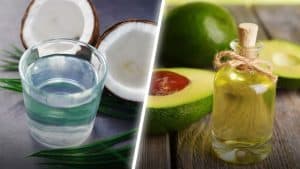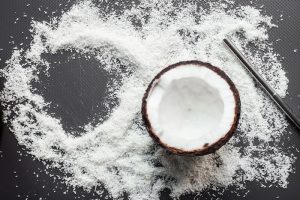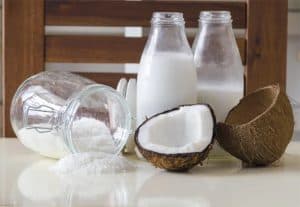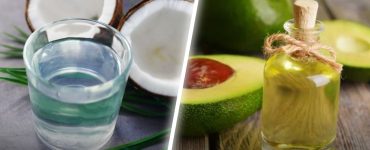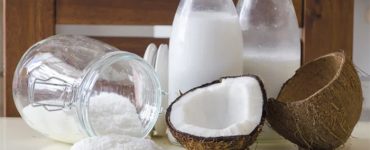Coconut oil has long been known for its benefits to the skin and hair. For many years, people have been using coconut oil to keep their hair healthier and their skin clearer. However, despite its amazing perks, there are also a few concerns about using coconut oil.

For example, some claim that applying coconut oil made their hair very staticky. Others even claim that they noticed more white hair because of using this oil. Does coconut oil make your hair white in the first place?
Don’t worry because it seems there is no basis for this. Coconut oil doesn’t make your hair white. Instead, it can help you say goodbye to those grays in no time.
Whether you like it or not, you will get some gray strands at one point. Sadly, constantly coloring them is not only unhealthy for your skin but can also cause a significant dent in your wallet. The good news is that using coconut oil is a popular traditional remedy for gray or white hair.
Considered the magical elixir of youth, it is said that coconut oil has anti-aging properties that can turn your white hair into the original hair color that you were born with.
Coconut oil is rich in various nutrients that can help keep your hair healthy. Continue reading below to know if these claims are backed by scientific evidence and learn how you can use coconut oil to address your white hair problems.

Why Should You Use Coconut Oil on White Hair?
As you get older, the free radicals and oxidative stress in your body also increase while the natural defense systems of your body become weaker. The amount of melanin pigment that serves as the protection of your hair and skin from free radicals and harmful UV rays also reduces. It then leads to canities or graying hair.
Coconut oil serves as a natural sunscreen that has an SPF of 8. It is this unique property of coconut hair that allows it to help fight oxidative stress. This is why it is assumed that coconut oil doesn’t make your hair white. Instead, it can help delay the graying of your hair.
Some anecdotal evidence also shows that coconut oil encourages hair growth and reduces the risks of premature graying of hair. Coconut oil can also be a natural substitute for chemical dyes that can be damaging to your tresses in the long run.
To understand it better, it is best to look at your hair from a microscopic level. The outer layer of your hair known as the cuticle consists of keratin in shingles form. They act and look like roof shingles. When these shingles are in tip-top shape, they lay flat and evenly, protecting the hair shaft from gaining or losing too much water or moisture too rapidly.
Things can change if they are exposed for a long time to heat, water, friction, heat, environment, and other external factors. Once the shingles become extremely damaged from heat or bleaching, they can become broken, split, or thin which can cause the hair to gain or lose excessive moisture.
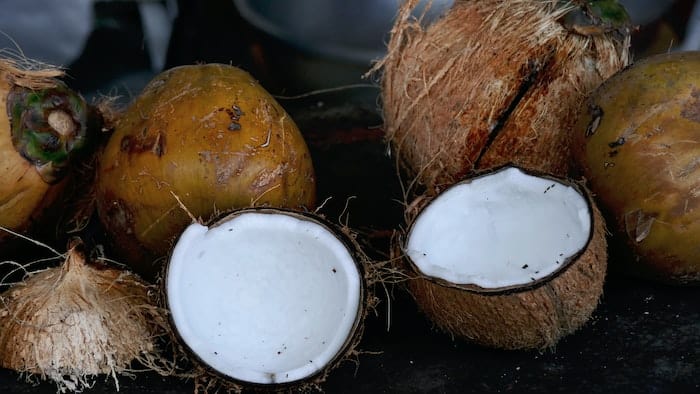
A lipid layer coats the cells that form the cuticle. Lipids are water-insoluble fatty acids. These are broken down with different solvents such as soaps as well as other alkaline treatments including bleaching agents and relaxers. When these lipids are damaged, the cuticle shingles open up, allowing the chemicals to enter and alter the cortex. It is the reason why many manufacturers and consumers use oil for hydration.
Does it mean that putting oil on your hair will fix the split and broken shingles? Not likely but it will still help stop the water from getting into the shingle. You might assume that it is helping when the truth is that underneath, it is still split and dry.
Your hair also has a cortex layer that is similar to rafters and insulation in your roof. It forms the bulk, or what is often called fine or coarse strands. It also creates color through the storage of melanin. It is also a strength, containing some protein and providing moisture. You will have strong hair if the cortex is also healthy with balance moisture-to-protein ratio. The healthiest cortex can be found in virgin hair, or hair without heat damage, perms, relaxers, or color treatments.
The medulla is the hair shaft’s inner core. It is similar to the open space in the attic. In some blonde hairs, fine hair, and white hair, there is no medulla, which means your cuticle is already damaged, making your hair shaft prone to staining, split ends, and breakage.
This is the reason why white hair can become more prone to different environmental factors like rough or vigorous scrubbing, using terry cloth towels that cause friction that can be damaging to the cuticle, overuse of drying ingredients such as denatured alcohol, heating tool damage, and sun damage.
What Can Coconut Oil Do for Your Hair?
Different types of oils also have different molecular structures. The molecular structure will dictate a lot of things such as the ability of the oil to penetrate the hair shaft.
Oils like coconut oil are lipids or insoluble fats. Your skin also produces its own insoluble fat known as sebum. Your hair itself features a protective lipid coating, which means that oils serve a distinct role in hair care.
When it comes to coconut oil, less is often more. Rather than applying a large amount, it is best to apply a moderate amount of coconut oil to your damp hair. You can use it as a pre-shampoo applied 30 minutes before shampooing. You can also sleep in it overnight and then wash it out with shampoo the following morning. Although coconut oil can penetrate the hair shaft, it works best with higher porosity strands.
No, coconut oil doesn’t make your hair white. Instead, with proper use, it can even help you prevent those gray strands from showing up prematurely while enjoying healthier tresses that you can flaunt with no worries.


